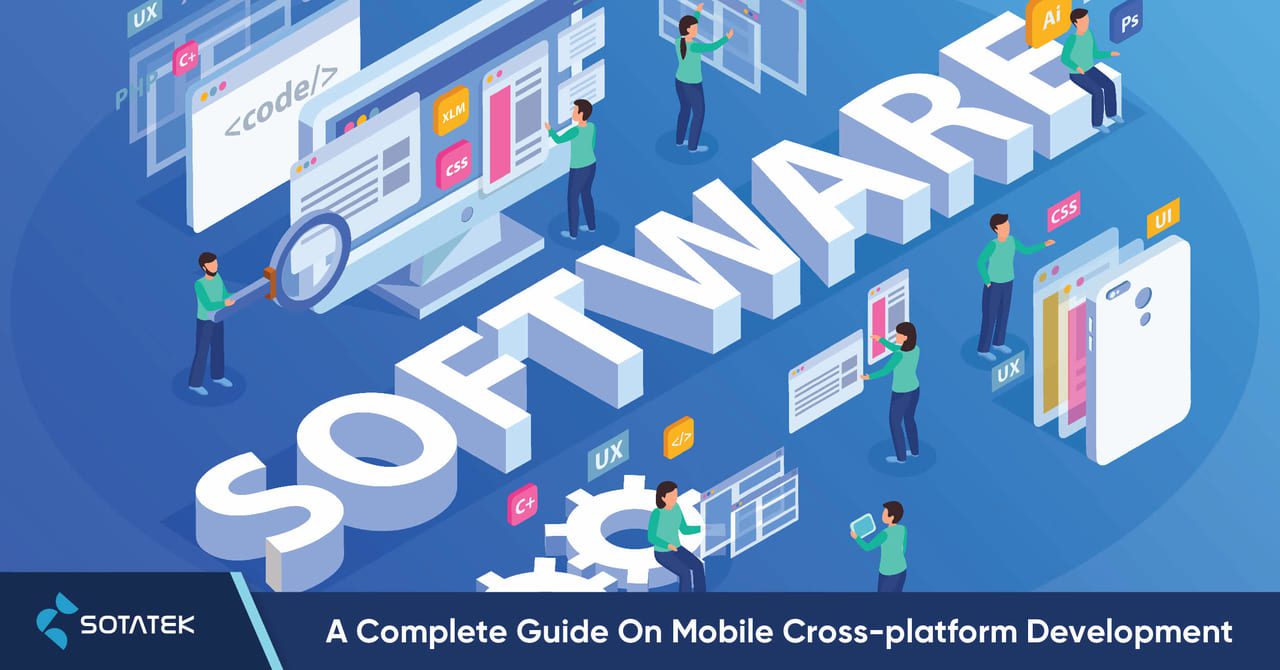When kicking off a Mobile App Development Project, businesses are likely to attract and target potential customers as much as possible. They want their apps to run smoothly and seamlessly on multiple platforms, including iOS, and Android. If they solely develop apps for iOS customers, they risk losing Android users, and vice versa. However, businesses hardly have enough investment and resources to have separate development teams to build native apps for each platform. In that case, Mobile Cross-platform Development existed and showed its huge potential. This development type helps businesses in expanding their presence on either platform: Google Play Store or the Apple App Store with cost-effectiveness. To learn more about this topic, check this blog below!
1. What Is Mobile Cross-platform Development? Difference Between Cross-Platform And Native App
Cross-platform Mobile App Development refers to the approach that requires Software Providers to build an app simultaneously compatible with several operating systems and platforms (Android, iOS, Windows). The source code is written once for all platforms, and the software can be launched and updated by using a variety of cross-platform development tools. Therefore, it can be said that Mobile Cross-platform will help businesses cover many end devices at lower costs.

Mobile Cross-platform Development works well on different platforms
The aforementioned features of Cross-Platform are far different from the Native Mobile Apps, which require separate tools and programming languages for each platform. For example, iOS apps are written by Objective-C and Swift; Java, C/C++, and Kotlin are used in Android solutions; C# and Visual Basic are optimal for Windows Phone. Although a Native App may fully exploit the existing features and capabilities of a targeted device, your business will be unable to reach a larger audience. If you want to develop several solutions (one app for each targeted platform), it is really time-consuming and expensive.
2. Pros and Cons of Mobile Cross-platform Development
Benefits of Mobile Cross-platform Development:
- Exposure to the target audience: You can serve customers on all platforms thanks to cross-platform mobile app development.
- Low development cost: Cross-platform applications are based on the concept write once and running everywhere. Developers just need to write the source code once and then run the applications on both iOS and Android devices.
- Easy maintenance and deployment: In cross-platform app development, a single universal program runs on all platforms. When changes are made, the development team can immediately synchronize updates across all platforms and devices, hence saving a huge amount of time and money.
Disadvantages of Mobile Cross-platform Development:
- Limited functionality: It can be more difficult for the Tech Vendor to navigate smartphone capabilities such as the microphone, camera, and geolocation than a native app.
- Limited UX: Cross-platform apps are unable to take advantage of native UI elements. As a result, it can't provide the platform's usual UX experience.
- Slow speed: Due to an additional abstract layer and rendering process, the cross-platform app is slower than its native counterpart.
3. Top Frameworks For Cross-platform Development
a. React Native
React Native is a cross-platform mobile development framework based on React, a best-in-class JavaScript library for developing user interfaces. It has the advantage of allowing modules to be written in languages like C, Swift, and Java.
The following are the primary advantages of adopting React Native for cross-platform app development:
- Developers can watch any code changes in real-time without needing to save them first.
- It enables the use of third-party plugins.
- Because it concentrates on mobile UI, its User Interface is simpler and resembles a JS library rather than a framework.
- It provides a more stable app than all other frameworks.
b. Flutter
Flutter is an advanced, open-source software development kit (SDK). It supports high-performance applications on multiple platforms, including iOS, Android, web, and desktop, using a single codebase.

Flutter is top framework for Cross-platform Development
Benefits of Flutter:
- A large selection of UI elements and widgets make app development not only quick but also visually appealing.
- A high-performance rendering engine allows developers to quickly customize animations.
- The hot-reload feature allows programmers to see any coding changes in real-time without having to save their work.
c. Xamarin
It's a unique framework for developing mobile apps for Android and iOS devices using a single code base rather than two separate ones. The best thing about the Xamarin cross-platform tool is that all of the apps are created with their look and feel like native apps, thanks to native interfaces that perform as expected by users. Its development toolset consists of the following elements:
- Xamarin Studio/Visual Studio (its own IDE)
- Xamarin SDKs
- Xamarin Test Cloud
- Xamarin.Mac to build native Mac apps
4. Wrap Up
To sum up, mobile cross-platform development is rising in popularity. It can eliminate the efforts to develop different apps for different platforms while allowing businesses to target a larger customer base.
If you are wondering “What is the best cross platform app development company?” or “How to hire a mobile app development company?”, feel free to contact us. With the vision to become a Software Development Company with a global position, SotaTek always stays ahead of the wave of technology. During 6+ years of establishment, our IT experts have delivered hundreds of solutions for Clients from 20+ nations worldwide, in different industries, such as Finance, Health Care, Logistics, F&B, Media & Entertainment, Retail, Real Estate, and Education. So, why not join our partnership network right now to start skyrocketing your business?



